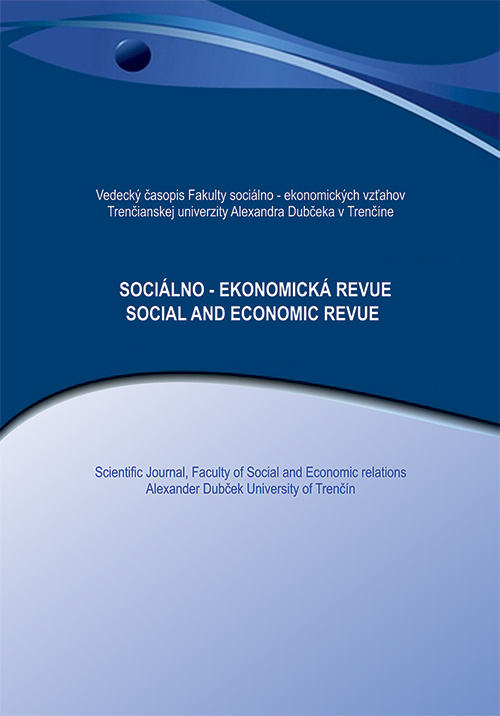THE IMPORTANCE OF EDUCATION AND THE THREAT OF UNEMPLOYMENT IN THE CONDITIONS OF THE DIGITAL ECONOMY
The current pace of progress raises widespread concerns about rising technological unemployment. One of the ways to face it will be to adapt the skills and abilities of workers to the new conditions. However, the development of digitalisation does not only place new requirements on traditional education systems, which are no longer able to train workers with adequate skills, but are also expected to lead to a change in the legal regulation of industrial relations. The aim of the article is to theoretically define what changes digital transformation brings to society, what is its essence and what impact it can have on the growth of unemployment. In addition, from the statistics available at Eurostat, to find out the situation in selected European countries in terms of internet accessibility and the digital skills of the population, as these are key indicators for the introduction of digitization elements, and to highlight how the last fifteen In recent years, the unemployment rate in the Slovak Republic developed depending on the level of education attained.
Vydanie: 2020/3 Strany: 43-51 Klasifikácia JEL: E24, I21, O30
DOI:
Kľúčové slová: digitization, digital skills, education system, Slovak Republic, unemployment
Sekcia:
Kontakty:
Ing. Veronika Žárská
Department of Management and Human resources development,
Faculty of Social and Economic Relations,
Alexander Dubček University of Trenčín
Študentská 3, 911 50 Trenčín
e- mail: veronika.zarska@tnuni.sk
Literatúra:
Collins, R. (1979). The Credential Society. An Historical Sociology of Education and Stratification. New York, San Francisco & London: Academic Press, 222 p. ISBN: 9780231192354
Dzurilla, V., Očko, P. a kol. (2018). Digitální ekonomika a společnost. Vládni program digitalizace České republiky 2018. 20 p. [online]. [cit. 2020-12-28]. Retreived from: Microsoft Word - 03_Program Digitální Česko_Digitální ekonomika a společnost.docx (iinfo.cz)
Ernst, E., Merola, R., Samaan, D. (2019). Economics of Artificial Intelligence:
Implications for the Future of Work. IZA Journal of Labor Policy, 9 (4), pp. 1-35. [online]. [cit. 2020-12-26]. Retrieved from: (PDF) Economics of Artificial Intelligence: Implications for the Future of Work (researchgate.net)
European Commission. (2020). Digital Economy and Society Index (DESI) 2020. Thematic chapters. 124 p. [online]. [cit. 2020-12-28]. Retreived from: https://ec.europa.eu/
Eurostat. Statistics A-Z. [online]. [cit.2020-11-04]. Retreived from: https://ec.europa.eu/eurostat/data/statistics-a-z/def
Horáková, M., Horák, P. (2013). Zaměstnatelnost skupin ohrožených nezaměstnaností na současných trzích práce. Sociológia, 45 (2), pp. 128-149. [online]. [cit.2020-11-07]. Retreived from:https://www.researchgate.net/publication/269989636_Zamestnatelnost_skupin_ohrozenych_nezamestnanosti_na_soucasnych_trzich_prace
Hrabčák, L., Stojáková, M. (2020). Digitálna ekonomika, digitálne služby a daň z digitálnych služieb – hrozba alebo výzva pre normotvorcov? STUDIA IURIDICA Cassoviensia, 8 (1), pp. 15-28. [online]. [cit. 2020-12-27]. Retrieved from: DIGITÁLNA EKONOMIKA, DIGITÁLNE SLUŽBY A DAŇ Z DIGITÁLNYCH SLUŽIEB – HROZBA ALEBO VÝZVA PRE NORMOTVORCOV? (researchgate.net)
Islam, I. (2018). Automation and the Future of Employment: Implications for India. South Asian Journal of Human Resources Management, 5(2), pp. 234–243. [online]. [cit. 2020-12-25]. Retrieved from: https://journals.sagepub.com/doi/full/10.1177/2322093718802972
Itsakov, E., Kazantsev, N., Torshin, D. (2019). Digital Economy: Unemployment Risks and New Opportunities. Digital Transformation and Global Society, pp.292-299. [online]. [cit. 2020-12-29]. Retrieved from: (PDF) Digital Economy: Unemployment Risks and New Opportunities (researchgate.net)
Kollár, V., Polakovič, P., Gasperová, J. (2015). Digitálna gramotnosť občana ako fenomén súčasnej informačnej doby. Zborník z medzinárodnej vedeckej konferencie. Bratislava, pp. 137-140. [online]. [cit. 2020-09-30]. Retrieved from: https://www.sszp.eu/wp-content/uploads/2015_conference_SES__p-137__Kollar-Polakovic-Gasperova_.pdf
Pulkka, V. (2019). “This time may be a little different” – exploring the Finnish view on the future of work. International Journal of Sociology and Social Policy, 39 (1/2), pp. 22-37. [online]. [cit. 2020-12-24]. Retrieved from: “This time may be a little different” – exploring the Finnish view on the future of work (researchgate.net)
Stavytskyy, A., Kharlamova, G., Stoica, E. A. (2019). The Analysis of the Digital Economy
and Society Index in the EU. Baltic Journal of European Studies, 9 (3), pp. 245-261. [online]. [cit. 2020-12-24]. Retrieved from: The Analysis of the Digital Economy and Society Index in the EU in: TalTech Journal of European Studies Volume 9 Issue 3 (2019) (sciendo.com)
Sima, V., Gheorghe, I. G., Subic, J., Nancu, D. (2020). Influences of the Industry 4.0 Revolution on the Human Capital Development and Consumer Behavior: A Systematic Review. Sustainability, 12 (4035). [online]. [cit. 2020-09-25]. Retreived from: https://www.mdpi.com/2071-1050/12/10/4035
Sundararajan, A. (2016). The Sharing Economy. The End of Employment and the Rise of Crowd-Based Capitalism. MIT Press Ltd, 256 p. ISBN: 9780262034579
Štatistický úrad SR. Databázy. [online]. [cit.2020-11-10]. Retreived from: https://slovak.statistics.sk/wps/portal/ext/Databases/
Wolf, A. (2002). Does Education Matter?: Myths About Education and Economic Growth. London: Penguin Books. 332 s. ISBN 9780140286601


